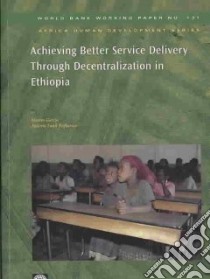Achieving Better Service Delivery Through Decentralization in Ethiopia - 9780821373828
Un libro in lingua di Marito Garcia Rajkumar Andrew Sunil edito da World Bank, 2008
- € 19.30
- Il prezzo è variabile in funzione del cambio della valuta d’origine
Achieving Better Service Delivery Through Decentralization in Ethiopia examines the role decentralization has played in the improvement of human development indicators in Ethiopia.Ethiopia has made major strides in improving its human development indicators in the past 15 years, achieving significant increases in the coverage of basic education and health services in a short period of time. Improvements took place during a period of massive decentralization of fiscal resources, to the regions in 1994 and to woredas in 2002-03. The devolution of power and resources from the federal and regional governments to woredas appears to have improved the delivery of basic services.Surveys of beneficiaries reveal that they perceive that service coverage and quality have improved. Beneficiary satisfaction has increased markedly in education, and less conspicuously in water and health services. In the south, the decentralization to woredas in 2002-03 tended to narrow differences in per capita expenditures on education and health across woredas. Decentralization disproportionately favored woredas that are remote (more than 50 kilometers from a zonal capital), food-insecure, and pastoral, suggesting that decentralization has been pro-poor.Decentralization also narrowed the gap in educational outcomes between disadvantage and better-off woredas, especially in the south. Pastoral, food-insecure, and remote woredas gained in terms of the educational outcomes examined (gross enrollment rates, grade 8 examination pass rates, repetition rates, pupil-teacher ratios, and teacher-section ratios).
Informazioni bibliografiche
- Titolo del Libro in lingua: Achieving Better Service Delivery Through Decentralization in Ethiopia
- Lingua: English
- Autori : Marito Garcia Rajkumar Andrew Sunil
- Editore: World Bank
- Collana: World Bank (Paperback)
- Data di Pubblicazione: 01 Gennaio '08
- Genere: POLITICAL SCIENCE
- Argomenti : Decentralization in government Ethiopia Public administration Ethiopia
- Pagine: 110
- Dimensioni mm: 247 x 177 x 6
- ISBN-10: 082137382X
- EAN-13: 9780821373828


